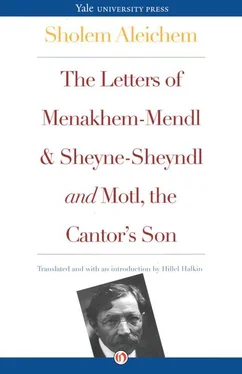Mendl and I vawked farthest back, stopping at every shop window. It gave us a good feeling to see that the magazines were all in Jewish and that there were all sorts of other Jewish things: siddurs, and tallis kotons, and yarmulkas, and mezuzahs, and matsos. Matsos in the middle of winter, months before Passover — talk about a Jewish town! But we couldn’t stop for long because my mother kept shouting: “Follow me!” We followed her.
Anyone who’s never seen a New York strit has missed something grand. What don’t you find there? Jews peddle their wares. Women sit and talk. Babies sleep in little wagons called kerredshiz. Every kerredsh looks alike. The babies drink milk from tiny bottles. The children play. There are thousands of games: button games, hoop games, ball games, curb games, rawlehskeyt games. A rawlehskeyt is a shoe on four wheels. You put it on and roll away.
The noise the children make is deafening. The strit belongs to them. No one would dare tell them to leave it. In fact, America is a land made for children. That’s what I love about it. Just try laying a hand on a child! My brother Elye learned that the hard way. He was taught a lesson he’ll never forget. Here’s what happened.
One day Mendl and I were playing tshekehz in the strit. Tshekehz is a game you play by shooting little round pieces of wood. Along comes my brother Elye in the middle of the game, grabs my ear, and gets set to whack me like in the good old days.
But before Elye can haul off and hit me, up pops this tall kid. He pushes me out of the way, rolls up his sleeves, and says something to Elye in American. Since Elye doesn’t understand much American, the kid spells it out with a punch in the nose. Pretty soon there’s a circle around us. Elye tries explaining in Jewish that it’s his job as my brother to teach me good manners. The circle answers back that America doesn’t work that way. In America you pick on someone your own size, brother or no brother.
I ask you: how can you not love such a place?
I’ve been talking so much that I’ve forgotten to tell you that we’ve reached Pesye and Moyshe’s house. I walk through the door and look around — not one of the old gang is there. There’s no sign of Bumpy or anyone. Where are they all? Just wait until you hear.
The gang was at work, every one of them! But before I tell you what each of them does, let me tell you how a Jewish bookbinder lives in America.
First, the apartment. Back home in Kasrilevke, Fat Pesye would have been afraid to live so high. You climb what must be a hundred stairs until you come to a mansion with a bunch of what Americans call rumz. There are big rumz and little rumz, each with beds and mattresses and curtains on every window. There’s a kitshn too, which is where the cooking is done. Instead of an oven there’s an iron plate with holes; you turn a knob and fire shoots up as if by magic. And there’s water from the walls, all the hot and cold water you could want. You turn a faucet and out it comes.
Later that day Elye and Brokheh came to see how we were doing. Pinye took them to the kitshn, showed them the faucets, and gave them one of his speeches:
“Well, Elye, what do you say about Columbus now? Show me the Russky who’s worth his little finger! All they have back in Russia is vodka and pogroms. They deserve to croak, every one of them.”
Elye didn’t let him get away with that. “You may be big on Columbus now,” he answered Pinye, “but you sang a different song on Ella’s Island.”
Pinye said that Ella’s Island wasn’t America. It was the border between America and the world. Baloney, Elye said. They were starting to fight when Brokheh stepped in. The two of them, she said, knew as much about it as they knew what happened in the grave. The whole argument wasn’t worth a plugged penny.
You’ll excuse me for getting sidetracked. I was telling you about Moyshe and Pesye’s apartment. I’ll get back to it and their boys, the whole gang.
You can bet that Moyshe and Pesye never dreamed of so many bedrumz, let alone a deininkrum. That’s a word we can’t figure out. A bedrum, fine, it has a bed in it — but what’s a deinink? Why not call it the eedinkrum?
Moyshe the bookbinder hears us discussing it and says: “Why lose sleep over it? Who cares as long as we’ve got a fine place, thank God, and my boys all have work, and we’re making a living in America?”
I look at him and think: God Almighty! How a man can change! Back home you never heard him say a word. It was always Pesye, Pesye, Pesye. All Moyshe ever did was make glue and paste books. Now he’s grown a head taller. What making a living doesn’t do for a man! All his children are bringing home money too. I’ll tell you what each does and how much he earns. I hate to admit it, but my mother is jealous that Pesye has so many boys.
Pesye’s oldest boy used to be Log. In America he’s Sem. Why Sem? Search me. All I know is, he’s earning well. He’s got a dzhahb with a peyprbahks fektri. If that’s Chinese to you, I’ll set you straight.
A peyprbahks fektri is a place where they make cartons. Don’t think it’s such a big dzhahb. Log doesn’t make the cartons. He just brings them to the kahstemehz. That’s called a dehlivri boi. Log takes a bondl of cartons under each arm, ten dozen to a bondl, and runs through the strit dodging kahz. The trick is to keep the cartons from getting crushed. Log makes a dahleh-and-a-half a week and is hoping for a reyz. That means more money. He says he can make as much as three dahlehz. His bawss tells him that if he sticks around he’ll teach him to be a carton maker. “Be a gud boi and you’ll be awreit,” he tells him. In Jewish you would say, “If you’re nice, I’ll let you eat in my sukkeh.”
Moyshe and Pesye’s second son, Velvel Tomcat, now goes by the name of Villi. He’s a dehlivri boi too and works for a grawsri staw. That’s a place that sells food and other stuff. Tomcat’s dzhahb is harder than Log’s. He gets up at an hour when even God is still asleep and arranges and packs all the awdehz. An awdeh is a bondl brought to a kahstemeh with rolls, butter, cheese, eggs, sugar, milk, and krim. Sometimes Tomcat carries the awdeh all the way to the tahpflaw, which is the apartment under the roof. He has to be quick. There’s no time to catch his breath, because he’s expected back in the staw to sweep and clean. By noon he’s finished and free for the day. He doesn’t make a whole lot, just fifteen cents a day, except for Fridays. Fridays he gets a kvawdeh plus a hallah to take home.
Log and Tomcat are the two oldest in the gang. Their younger brothers can’t work mornings because of skul. That’s American for heder. It’s free and so are the books. You better go or else.
Pinye went crazy when he heard that. Back in Russia, he says, they don’t allow Jews to go to school and here they don’t allow them not to! If you miss skul you’re arrested by a trunt ahfiseh. “Those Russkies should be buried alive just for that,” Pinye says.
Skul being only half a day, you can work the other half. All Pesye’s boys do. Ratface works in a drahgstaw. That’s an apothecary’s. He washes bottles and goes to the pawstuffis for stemps. In America you can buy stemps in a drahgstaw. Ratface makes a dahleh-and-a-kvawdeh a week.
“That doesn’t grow on trees,” Moyshe the bookbinder says, pocketing Ratface’s pay.
Faytl Petelulu is now Filip. After skul he sells the Jewish noospeypehz. He runs up and down Ist Brawdvey — that’s a street — shouting: “Ekstreh! Ekstreh!” Every peypeh has a name. Petelulu makes fifty cents and more a day. It goes to the family. Everyone makes a living and Moyshe pays all the bills.
Even my friend Bumpy is earning money. He just isn’t Bumpy any more. He’s Herry and he goes to skul too. Afternoons he minds a stend on Rivinktn Strit that belongs to a woman from Kasrilevke. He helps her sell rice, barley, millet, peas, beans, nuts, raisins, almonds, figs, dates, carob pods, and pickles. It’s not a whole lot of work.
Читать дальше












